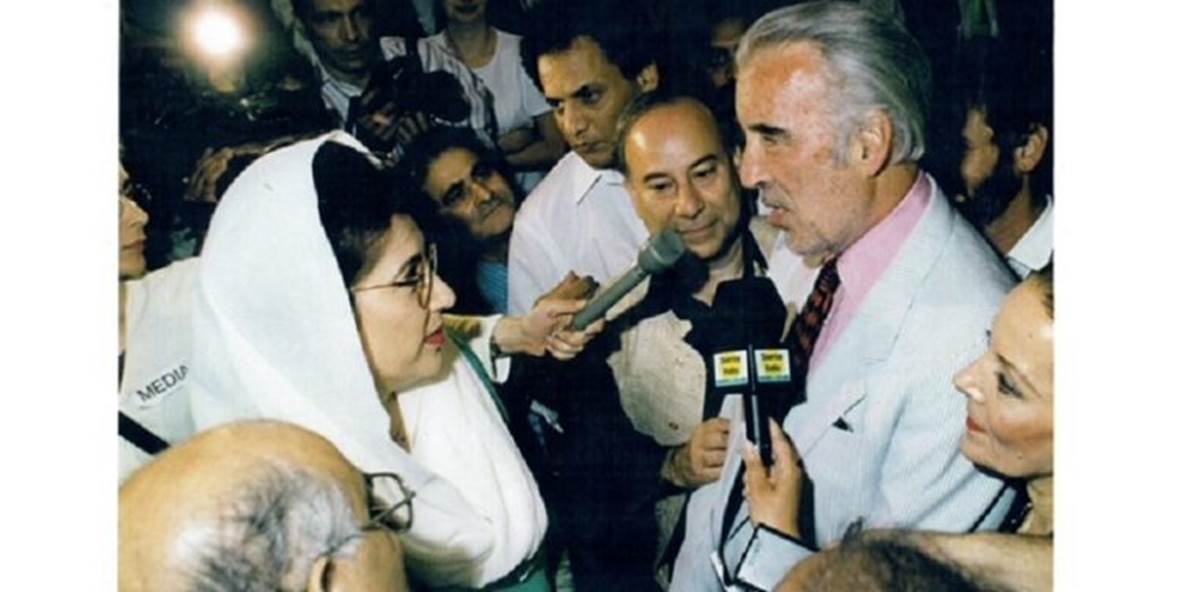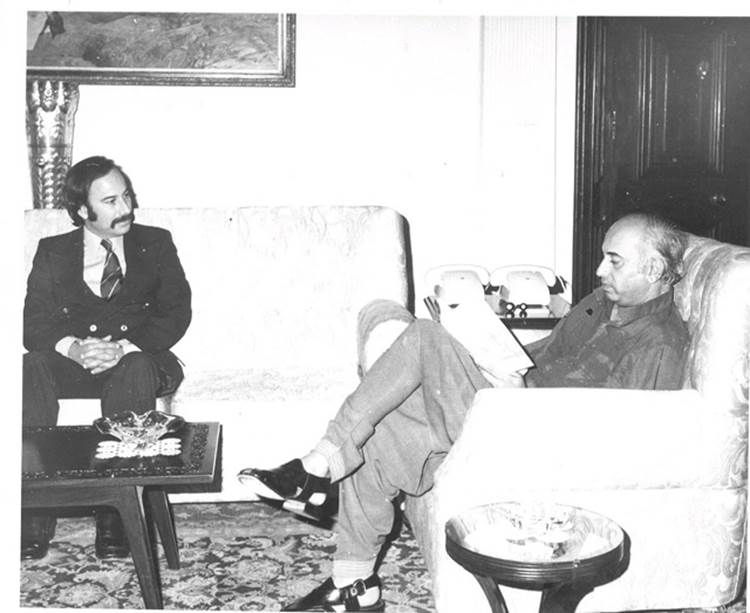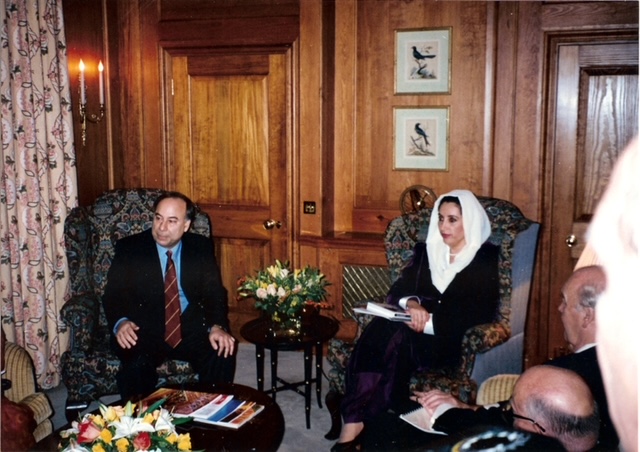
At the book launch: Benazir Bhutto (left), the author (center) and Christopher Lee (right)
When Benazir Bhutto Launched My Jinnah Book at SOAS, London
By Dr Akbar Ahmed
American University
Washington, DC 
“Benazir Bhutto has been killed, and we want you live on BBC television straight away, please.” It was early morning in Washington, DC, in December 2007, and the weather was freezing. I was still half asleep in my bedroom, so the words created confusion and consternation in me. “Killed,” I heard again and again.
The shock of the news was like a detonating grenade, as I knew it would have a devastating impact on Pakistan, whether people supported her or not.
This was possibly the most difficult interview I have given. Certainly, one of the most surreal. I stumbled down half-awake to the living room with the telephone in my hand and switched on the television to see the breaking news of Benazir’s death. I felt an overwhelming sense of grief. It was the loss of an extraordinary visionary and political leader. I was dumbstruck. Yet on the screen I saw my own image as the BBC announced that I would be making the commentary. I had to quickly gather my thoughts and make some coherent remarks about Benazir Bhutto.
As I marshalled my thoughts, some personal images and events came hurtling at me. One, in particular, stood out. It was when Benazir Bhutto, former Prime Minister of Pakistan, launched my book Jinnah, Pakistan, and Islamic Identity: The Search for Saladin, at the School of Oriental and African Studies, University of London, on August 12, 1997. The book had been just published by Routledge in London and was then published by Oxford University Press in Karachi.
On that day, some 400 people had packed the newly opened Brunei Gallery at SOAS. Benazir turned up with an escort which included her loyal friend the redoubtable George Galloway, member of parliament and strong supporter of Pakistan. Christopher Lee was among the audience, and I have a great picture of him talking to Benazir after I introduced them to each other. She graciously thanked Lee for his great role in the feature film Jinnah.
As I entered the Brunei Gallery, I heard her talking to Zeenat, my wife, who was standing at the entrance. They had been at school together and Benazir always made it a point to ask about her warmly. On this occasion Benazir spoke loudly and enthusiastically about my accomplishments. Zeenat said that Benazir was effusive. She used expressions like “your husband is the pride of Pakistan. He’s a national treasure,” etc. Later, Benazir was seated next to me in the front row of the gallery and made remarks to me from time to time. When my daughter Nafees, then seven years old, spoke passionately from the stage, barely reaching the mike on the rostrum, Benazir said “She is a very bright girl and will make a name for herself.”
I found Benazir’s speech moving. Here is what she said; judge for yourself:
“This is an important occasion […] Professor Akbar has sometimes ploughed a lonely furrow with many obstacles natural and man-made, but he has always done so with something of the integrity of his and our hero the Quaid-i-Azam. But he should know, and that is why we are all here this evening, that his work at Cambridge, his books, films, his efforts to teach the new generation of Pakistanis the truths about their history has been widely and deeply appreciated[…] I thank Professor Akbar Ahmed for his gift to the people of Pakistan, indeed the world, in the form of his illuminating work on the founder of Pakistan in this our Golden Jubilee year.”
My aim in conceiving and completing the Jinnah Quartet was to make the life and achievements of Mr Jinnah available to all Pakistanis and even non-Pakistanis. I had conceived four projects and had aimed to complete them for Pakistan’s 50th anniversary. Three were complete, including my book, and the feature film with Christopher Lee would be completed the next year. Along the way, I had immense support but also faced great challenges. I was pleased that Benazir Bhutto would participate in my book launch, but troubled at the reaction of the High Commissioner, who saw her as an opposition leader and became agitated at the news.
Just before Benazir had turned up at SOAS, the High Commissioner asked me to talk privately, and we stepped outside. He was hopping mad. He started berating me and threatening me. I thought he would have a heart attack. He said that I must immediately disinvite Benazir and ensure that she does not turn up. He said he would lose his job if she came. And if she came, he would make sure my pay would be cut off. Such a threat was illegal and so was the act, but next morning he ordered his office that my pay be withheld. I was on study leave and entitled to what really was a meagre salary of several hundred pounds on which to support my family of five and myself, and often found it difficult to make ends meet. But it allowed me to pursue my academic ambitions and without it I would be in trouble. Fortunately, we were not extravagant and were able to manage although with some difficulty.
As the Iqbal chair and a fellow of Selwyn College, Cambridge, the irony did not escape me of a nation like Pakistan lagging in education, yet showing scant respect for its scholars.
I next heard of the matter when the High Commissioner rang me a few days later to complain that he had accompanied a VVIP to Pakistan and at the formal dinner in Islamabad where Benazir was also a guest she had reached across the table to complain to him that he had cut my pay and that he was being very unfair. He thought that I had asked Benazir to make a public complaint. I had not done so, but it was typical of the warmth and sense of justice in Benazir that she took up my cause on her own.
Several times over the years, she raised the idea of my joining her in an official capacity and I gently put away the suggestion. I had no desire to join her or any other political figure, as I did not have a very high regard for the working environment and methods of politicians. I was repelled by the sycophancy, intrigue and backstabbing. Best to stay away if I wished to preserve my integrity and sanity, I believed. It was the same with her father. Begum Bhutto, who knew my mother, had to come to our house in Karachi at a reception I had organized for my civil service academy batchmates and she told my mother – and then myself – that her husband Mr Bhutto wished me to meet him in Larkana and consider joining him. The idea chilled me as there was something fiercely temperamental about Mr Bhutto, that made me reluctant to be near him or his circle.

Z. A. Bhutto reading the author’s book on the Tribal Areas
I was also aware of his brilliance and charm. This side of his was on ample display a decade later when I presented him my book recently published by OUP on the Tribal Areas of Pakistan at the Governor’s house in Peshawar. The Governor, General Naseerullah Babar, had arranged the presentation. Bhutto took my book sitting comfortably in the sofa and began to leaf through it, making intelligent comments. He said the Indians would not be happy as he was attempting to integrate the Tribal Areas closer into Pakistan. He then asked the Secretary to the Prime Minister to come in. He told the Secretary that anytime “this young man” wanted to meet him, he should be given access.
Once when Benazir came on an official visit to London, I was invited for lunch and sat opposite her. It was a small but distinguished gathering. Sir David Frost was on my right side and Mr Khar the governor of the Punjab on my left. Several times Benazir leaned across the table to me and made a remark, often irreverently humorous. At one point she said sweetly to David Frost, “David, do you know that the gentleman on Akbar’s left has married almost as many times as you? I’m sure you two have much to talk about.” At another point, in the middle of an argument about Muslim history with an aged Oxford professor seated next to her, she leaned across and said, “Akbar would you come to my rescue and clarify a point of Muslim history with these gentlemen?”
At a major international conference at Chatham House, we were the two Muslim speakers. Other speakers included the likes of Gorbachev. It was a high-powered and distinguished audience. Benazir won over the audience with her charm and intelligence. “I am fighting terror and tyranny,” she said, “I am fighting your fight for democracy.” The crusty old faces began to soften. These hardened old think-tank warriors were melting in front of my eyes. I was on next, and talked about global ideas on the Clash of Civilizations and how to counter them. I could see the look of boredom on the faces in the audience. Eyes were glazing over. After I ended, I leaned across to Benazir and said, “That’s the last time I follow you on stage after you speak.” She smiled.
But I did speak after her, this time at the Marriott hotel in Islamabad. This was a conference in honor of Mir Khalil-ur-Rehman, a prominent newspaper man and owner of the Jang group. The great hall was absolutely packed. Benazir spoke and her PPP supporters went wild. Then the head of the Jamat-I-Islami spoke and a sizeable number of those present cheered for him. When I came up to speak next, there was a look of genuine puzzlement on the faces of most members of the audience. As I sat down, the Military Secretary to the Prime Minister was summoned by Benazir and she whispered something to him. He came to me and quietly said, “You will accompany the PM in her car. Follow us closely as we leave the hall,” he said.
As we came out, the PM’s car and escort were waiting, and the MS waved to me to sit with the PM. I was seated next to her. That was headline news and on the front page of Pakistani newspapers the next day. In the car and in her private lift to her office, she repeated, “What can I do for you?” I said, “Nothing, I want nothing. Just support me on the Jinnah project.” She said, “That’s done, but still would you like to be on my staff? Perhaps Secretary to the PM? Perhaps receive a civil award? Have you got the Star of Pakistan?” I said, “Thank you, I have everything. I just need your blessings for the Jinnah project.” I felt she was becoming mildly irritated, as anyone getting so close to her was expected to ask for favors.
When I joined American University as the Chair of Islamic Studies in 2001, I was told that Benazir Bhutto was on campus to give a talk. She had drawn a large crowd of faculty and students. I was already engaged elsewhere giving a talk, and by the time I came over to join the reception in her honor,, she had left. Several faculty and students came up to me and said, “You have a remarkable former Prime Minister.” I asked why. They said, “She was talking to the president of the university and proudly pointing out your books and Jinnah films.” She told them: “We have given you our greatest scholar and I hope you are appreciating his presence on your campus.”
Although aware of the controversies around her politics and the accusations of corruption, I admired her intellectual vision in which she was attempting to reconcile Islam with modernity and create a relationship of dialogue – if not harmony – with the West. I, myself, had been involved in a similar exercise over the last few years and appreciated the direction she was taking. It contrasted with the anti-intellectual and narrow-minded provincialism of many of the other politicians, whose only interest seemed to be to make money.
I knew her admiration for Jinnah was sincere when on returning to Pakistan, she headed straight for his mausoleum in Karachi, rather than that of her father. She had to make a choice, a very public choice, and decided to express a commitment to the father of the nation rather than her own father. On the way, her assassins attacked the large procession accompanying her and almost killed her.

The author with PM Benazir Bhutto
After her passing I was asked to speak about her. I was interviewed for Bhutto, a documentary on Benazir Bhutto, and was invited by After Words on C-Span to take part in a discussion with Mark Siegel on her last and perhaps most important book, Reconciliation: Islam, Democracy and the West.
When I think of Benazir and her warm tribute at my book launch a quarter of a century ago, her words become fresh and green in my memory, as if spoken yesterday.
“Professor Akbar has sometimes ploughed a lonely furrow with many obstacles natural and man-made, but he has always done so with something of the integrity of his and our hero the Quaid-i-Azam.”
(Akbar Ahmed is the Ibn Khaldun Chair of Islamic Studies, School of International Service, American University, Washington DC. He is a Wilson Center Global Fellow. He was the former Pakistan High Commissioner to the UK and Ireland and in 1970-71 was Assistant Commissioner in East Pakistan.)

